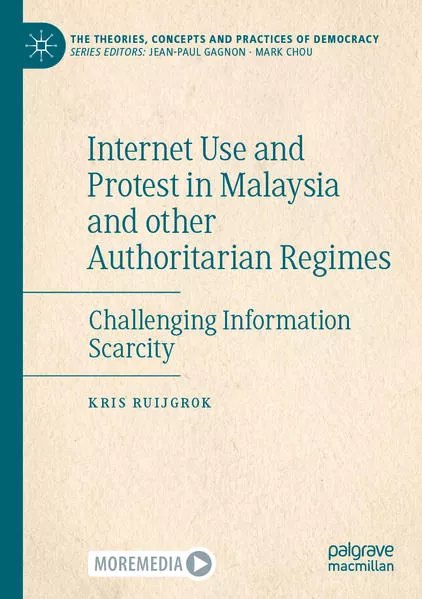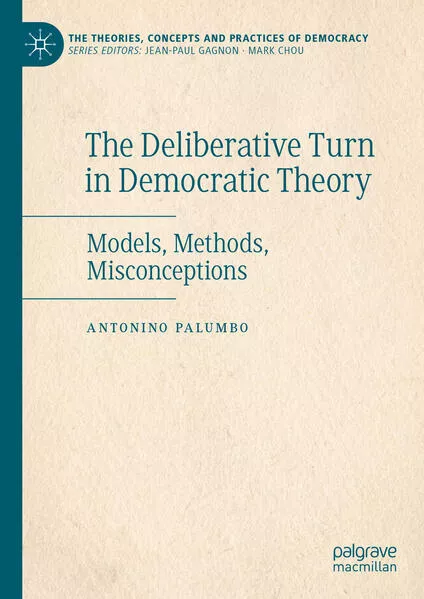The Theories, Concepts and Practices of Democracy
Internet Use and Protest in Malaysia and other Authoritarian Regimes
Chronologie aller Bände (1 - 3)
Die Reihenfolge beginnt mit dem Buch "Internet Use and Protest in Malaysia and other Authoritarian Regimes". Wer alle Bücher der Reihe nach lesen möchte, sollte mit diesem Band von Kris Ruijgrok beginnen. Der zweite Teil der Reihe "Political Opposition in Authoritarianism" ist am 14.08.2022 erschienen. Mit insgesamt 3 Bänden wurde die Reihe über einen Zeitraum von ungefähr 2 Jahren fortgesetzt. Der neueste Band trägt den Titel "The Deliberative Turn in Democratic Theory".
- Anzahl der Bewertungen für die gesamte Reihe: 0
- Ø Bewertung der Reihe: 0
- Start der Reihe: 15.04.2022
- Neueste Folge: 13.06.2024
Diese Reihenfolge enthält 3 unterschiedliche Autoren.
- Autor: Ruijgrok, Kris
- Anzahl Bewertungen: 0
- Ø Bewertung:
- Medium: Buch
- Veröffentlicht: 15.04.2022
- Genre: Politik
Internet Use and Protest in Malaysia and other Authoritarian Regimes
This book investigates the impact of internet use on anti-government protesting under authoritarian rule. By breaking up the causal chain into various steps, it provides a thorough and nuanced understanding of internet’s role in different stages of the mobilization process. It argues that the impact of internet use on anti-governmental protesting differs per step in the ‘mobilization chain’, and also that the effect depends on both the on- and offline repression of the regime, as well as on the type of internet that is available. While staying far away from any technologically deterministic claims about the internet, the book demonstrates that the internet especially plays an important role in the early stages of the mobilization process: By exposing citizens to alternative political information online, internet users are more likely to become sympathetic towards anti-governmental protest movements.
- Autor: Isaacs, Rico
- Anzahl Bewertungen: 0
- Ø Bewertung:
- Medium: Buch
- Veröffentlicht: 14.08.2022
- Genre: Politik
Political Opposition in Authoritarianism
How might political opposition shape regime outcomes over time in an authoritarian system? Most studies on political opposition in authoritarian contexts tend to focus on the agency of the regime over and above that of the political opposition. Using Albert Hirschman’s framework of exit, voice and loyalty, this book examines the case of Kazakhstani opposition agency over 30 years to explore the extent to which political opposition in Kazakhstan has shaped the dynamics of authoritarian regime development in the country. What the analysis reveals is that in Kazakhstan the regime has tended to treat formal institutional political opposition as neither a credible nor non-credible threat. Consequently, the Kazakhstani regime has always responded to opposition exit and voice with sanctions and institutional adaption which strengthened the regime in the short to medium term, but left them exposed to spontaneous, grassroots non-institutional opposition in the longer term. This spontaneous grassroots opposition emerged in Kazakhstan as a series of ‘shocks’ crystalised in the 2011 events in Zhanaozen, the 2016 land protests, the 2019 election protests and the events of ‘qandy qantar’ (bloody January) in 2022. What this book illustrates is how authoritarian regimes which treat opposition threats ambiguously are likely to end up in a continuous state of instability because the feedback provided by opposition agency disappears leaving the regime susceptible to spontaneous opposition.
- Autor: Palumbo, Antonino
- Anzahl Bewertungen: 0
- Ø Bewertung:
- Medium: Buch
- Veröffentlicht: 13.06.2024
- Genre: Politik


